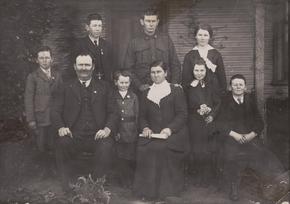JUDD, Ernest Arthur
| Service Number: | 62562 |
|---|---|
| Enlisted: | 12 July 1918 |
| Last Rank: | Private |
| Last Unit: | 1st to 6th (SA) Reinforcements |
| Born: | Yanac, Victoria, Australia, 5 July 1899 |
| Home Town: | Yanac, Hindmarsh, Victoria |
| Schooling: | Not yet discovered |
| Occupation: | Not yet discovered |
| Memorials: |
World War 1 Service
| 12 Jul 1918: | Enlisted AIF WW1, Private, 62562, 1st to 6th (SA) Reinforcements | |
|---|---|---|
| 22 Oct 1918: | Involvement Private, 62562, 1st to 6th (SA) Reinforcements, --- :embarkation_roll: roll_number: '20' embarkation_place: Adelaide embarkation_ship: HMAT Boonah embarkation_ship_number: A36 public_note: '' | |
| 22 Oct 1918: | Embarked Private, 62562, 1st to 6th (SA) Reinforcements, HMAT Boonah, Adelaide | |
| 30 Jan 1919: | Discharged AIF WW1, Private, 62562, 1st to 6th (SA) Reinforcements, Soldiers from the HMAT Boonah were discharged after being quarantined at the Quarantine Station at Woodman Point, south of Fremantle. More than 300 cases of influenza had been reported on board the Boonah, caught from stevedores in South Africa while loading supplies to the ship. The global influenza pandemic, which affected 3-5% of the world's population, had not yet arrived in Western Australia and the Commonwealth immigration authorities would not allow the soldiers on the Boonah to disembark and return home, even though the war had ended. |
Help us honour Ernest Arthur Judd's service by contributing information, stories, and images so that they can be preserved for future generations.
Add my storyBiography contributed by Blackwood High School
The Impact of War on Ernest Judd’s Community
World War 1 had a big impact on Ernest Judd’s community. Ernest Judd was born into a farming family with 6 other children, and farmers were not required to join the army. Instead, farmers were required to stay at home and produce food for their country. Therefore, most farmers stayed home, but some young farmers – like Ernest Judd – wanted to fight alongside their friends and/or for their country. Those men enlisted into the army even though they were farmers. Farms began to lose workers, and the soldiers families would worry about the man or boy who had just left. There was a likely chance that the soldier would die, and this caused stress for both the soldier and their family. Ernest Judd did not end up doing any fighting; only training in Mitcham and then probably Egypt. The cause for this was the ship he embarked on, the HMAT Boonah – which had been infected with the flu from South Africa – infected him with pneumonic influenza, and he and other soldiers had to be quarantined at Fremantle before the ship could continue to Egypt. The war ended while he was training in Egypt, so he therefore did not do any real fighting. Once home, Ernest Judd hardly talked about the war. This may be because while being on the Boonah, he witnessed fellow soldiers dying each day around him from the flu. Some men did not do fighting in the war because they were being quarantined, but they then died from the flu. Some men were ashamed that they came home only because they were sick, and they sometimes did not talk about the war for that reason. From the war, Ernest Judd and his community experienced stress, witnessed and/or heard about death and sickness, experienced hard labour for working the farms or training and fighting for their country, and sadness about their son, husband, or brother who left. It is obvious that Ernest Judd and his community were greatly impacted from World War 1.









